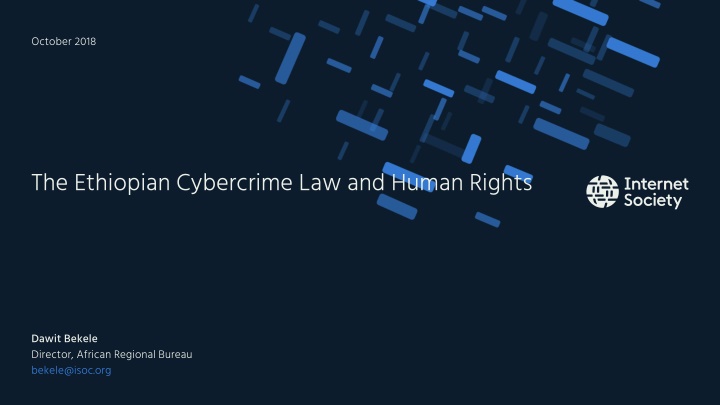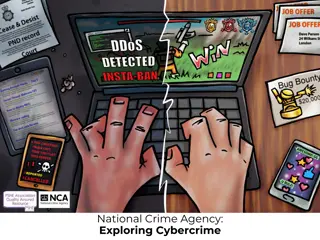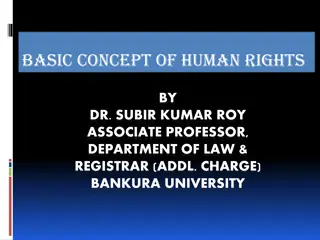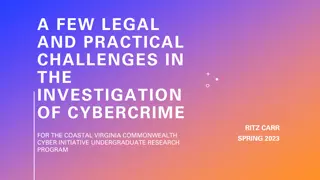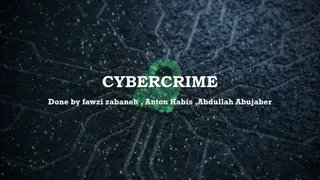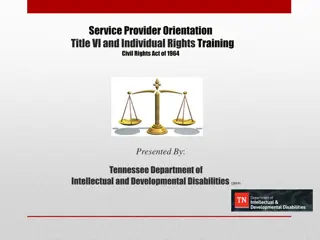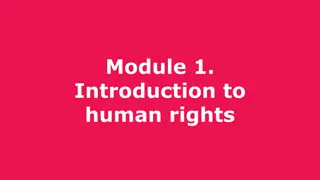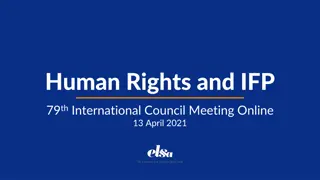The Ethiopian Cybercrime Law and Human Rights
The presentation delves into the problematic provisions of the Ethiopian Cybercrime Law, highlighting how certain clauses conflict with fundamental human rights declarations. Key points include the liability of intermediaries, reporting obligations, and the need for clearer legal terminology to prevent over-blocking of online content.
Download Presentation

Please find below an Image/Link to download the presentation.
The content on the website is provided AS IS for your information and personal use only. It may not be sold, licensed, or shared on other websites without obtaining consent from the author.If you encounter any issues during the download, it is possible that the publisher has removed the file from their server.
You are allowed to download the files provided on this website for personal or commercial use, subject to the condition that they are used lawfully. All files are the property of their respective owners.
The content on the website is provided AS IS for your information and personal use only. It may not be sold, licensed, or shared on other websites without obtaining consent from the author.
E N D
Presentation Transcript
October 2018 The Ethiopian Cybercrime Law and Human Rights Dawit Bekele Director, African Regional Bureau bekele@isoc.org Presentation title Client name
Background In 1991, TPLF/EPRDF toppled the DERG regime and took power In 1994: new Constitution For the last 27 years, EPRDF controls the legislature and executive Today, 100% of all members of parliament are from EPRF and affiliates In 2005, an almost democratic election, until The then PM stopped the counting of ballots and declared victory After that, the parliament enacted a number of repressive laws: The Media law (2008) The Anti-Terrorism proclamation (2009) The Charities and Societies proclamation (2009) The Computer Crime proclamation (2016) Meles Zenawi Ethiopian PM 1991-2012 2
Background By 2015, thousands of people are in prison using those laws The country revolted, triggering two consecutive state of emergencies Realizing that the country is hanging on a cliff PM resigned in Feb 2018 Dr Abiy Ahmed was selected as PM by EPRDF The New PM Acknowledged that the government has been using the law against its own people Released thousands of political prisoners Promised to reform repressive laws This presentation is on the aspect of the cybercrime law that we believe need to be amended Dr. Abiy Ahmed Ethiopian PM since April 2018 3
Problematic issues of the cybercrime law The law has many clauses that can help protect citizens against cybercrime However, it also has many provision that are in contravention of: The constitution of FDRE The Universal Declaration of Human Rights The International Covenant on Civil and Political Rights The African Declaration on Internet Rights and Freedoms The African Charter on Human and Peoples Rights Declaration of Principles of Freedom of Expression 4
Some problematic provisions Liability of Intermediaries The duty to report obligation (Art 27) requires communication service providers to report to Information Network Security Agency (INSA) and the Police when they become aware of the commission of cybercrimes or circulation of illegal content on their computer systems. Problem The term knowledge is unclear in legal terms This might push service providers to Monitor content to avoid penalties Over-block content to avoid risks Best practice No monitoring required Clear provision on removing content when informed 5
Some problematic provisions Access to computer by investigators Article 32 requires a warrant for investigators to access a computer Problem The Article extends the warrant to all computers connected to that computer This erodes individual rights of people whose computer systems would be accessed without specific warrant Best practice Warrant should be specific and targeted at a single computer system 6
Some problematic provisions Interception and surveillance of communication Article 25 says the the Attorney General may give permission to the investigatory organ to conduct interception or surveillance without court warrant where there are reasonable grounds and urgent cases The Attorney General shall present the reasons for interception or surveillance without court warrant to the President of the Federal High Court within 48 hours, Problem Why not get a post-facto authorization from the court to insure independence of the judiciary Best practice The court to provide the post-facto authorization 7
Some problematic provisions Retention of communication data Article 24: In English: One year retention In Amharic: Problem Service provider can keep any data for indefinite amount of time Best practice The provision should more focused, requiring a relationship between the data and a threat to public safety Include sufficient limitations and safeguards 8
Conclusion Cybercrime laws should be enacted by respecting the fundamental human rights of citizens The Ethiopian experience shows that using laws to criminalize law abiding citizens for political purpose is counter effective in the long term Cybercrime laws should not be used to curtail freedom of speech Cybercrime laws should be drafted in a truly multistakeholder manner by creating consensus between the various stakeholders 9
Thank you. Visit us at www.internetsociety.org Follow us @internetsociety Galerie Jean-Malbuisson 15, CH-1204 Geneva, Switzerland. +41 22 807 1444 1775 Wiehle Avenue, Suite 201, Reston, VA 20190-5108 USA. +1 703 439 2120 Dawit Bekele Director, African Regional Bureau bekele@isoc.org 10
Get involved. Visit us at www.internetsociety.org Follow us @internetsociety Galerie Jean-Malbuisson 15, CH-1204 Geneva, Switzerland. +41 22 807 1444 1775 Wiehle Avenue, Suite 201, Reston, VA 20190-5108 USA. +1 703 439 2120 There are many ways to support the Internet. Find out today how you can make an impact. 11
